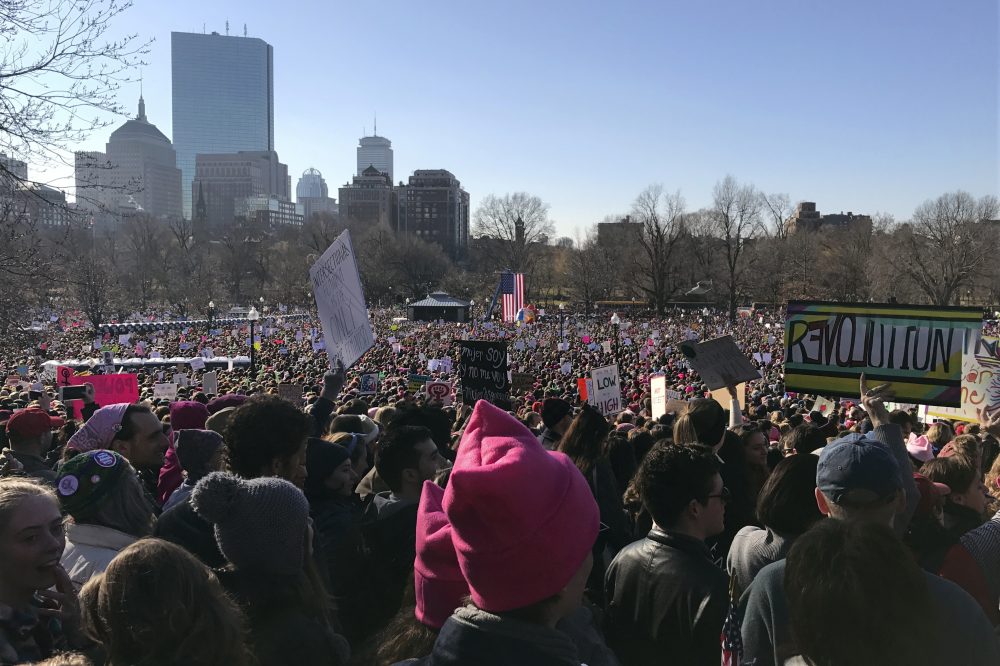Advertisement
Marching For A Mother, Grandmother, Daughter, Son — And Myself

COMMENTARY
At 8 a.m. this past Saturday, women took over car after car of a suburban commuter train, transforming that perfunctory downtown ride into 20 minutes of pure joy and purpose. We were headed to the Boston Common, one of the hundreds of satellite women’s marches taking place in all 50 states and 70 countries. At that moment we didn’t know that our message of love, hope and equality was about to resonate across seven continents. We only knew that we intended to reach out to each other across space and time to hold hands literally and metaphorically.
Saturday was the real inauguration — an inauguration of the people, by the people, for the people. In our expansive ceremony we celebrated life and found hope in the wake of a president’s inaugural speech delivered with bombastic rhetoric and filled with dystopian images. On the train, a thought came to me: What if the majority, albeit a thin majority, of white women in this country had not voted for Trump? An answer in the form of a silver lining: Millions of us would not have reminded each other how beautiful and colorful and lovely our country truly is.

A Trump supporter I know asked what was the difference between a protest and a march? I don’t know and frankly, I don’t care. I’m sure I witnessed the two melding together beautifully. We weren’t protesting any one thing; rather we rejoiced in our mesmerizing size, the largesse of our collective spirit. And we celebrated. Celebrated that in this great country of ours, which has always been great, we came together in pink pussy hats to inaugurate a new movement. Although we were men and women participating together, make no mistake that this march was founded, led and dedicated to women.
A reporter asked me what I was marching for. I introduced her to my 22-year-old daughter. I told her about my gay son. I said that my grandmother tried to abort a child and was miserable that she did not succeed. I marched for them, for me, for everyone. I marched wearing a pink hat so that bragging about grabbing any part of a woman’s body is not reduced to fictitious, hideous locker-room banter.
My mother called me the day after the march and asked me what right did I have to take her granddaughter to a dangerous, political event. “This is how it started in Havana,” said my Cuban-born mother. I explained to her that her adult granddaughter made her own decisions on when and where and how she wanted to communicate her values. Now that my mother is wheelchair-bound, her granddaughter and her daughter are her legs. “We marched for you,” I said. My mother grew quiet as I assured her that we, the marching women of Boston and Washington and Atlanta and Paris and Tel Aviv and beyond, were there to send a message: We will protect our bodies, our minds, our hearts and our souls at any cost.
We protested with our signs and prayed with our feet.
I understand my mother, too — she frequently time travels back to 1956 when dictator Fulgencio Batista closed the University of Havana and his henchmen murdered the president of the student federation. There were so many times in my mother’s memory that Havana looked like an armed camp. But the Women’s March was not a suppression of rebellious youth; it was a peaceful gathering of young and old, women and men, pink pussy hats and homemade posters. We protested with our signs and prayed with our feet. The woman who made our hats described herself as a "nasty woman" from Wisconsin who was honored that we would wear her creations. “March on with pride,” she wrote.
In an interfaith service just before the march began, I contemplated the Torah portion of the week: the first chapter of Exodus. One of the narrative strands that stands out in that chapter is the dramatic and heroic act of the midwives Shifra and Puah. These women refused to obey the Pharaoh’s order to murder newborn male children. “The midwives, fearing God, did not do as the king of Egypt had told them; they let the boys live,” says the text. Here is a stark moment in the Bible in which women have agency and use it to alter the course of history. If these Women’s Marches of love and size and hope show us anything it is this: Let us go forth and use our power for good.
